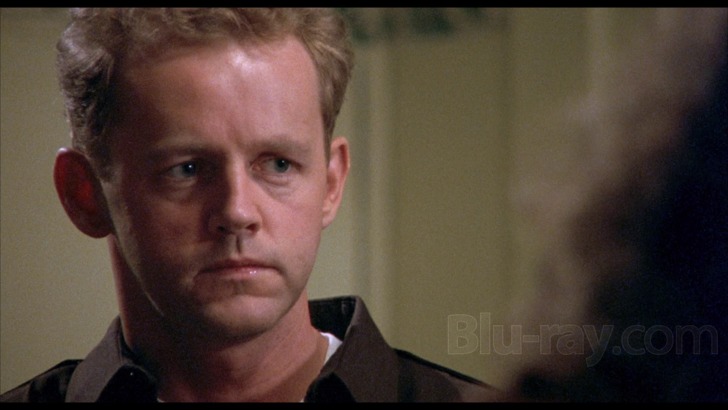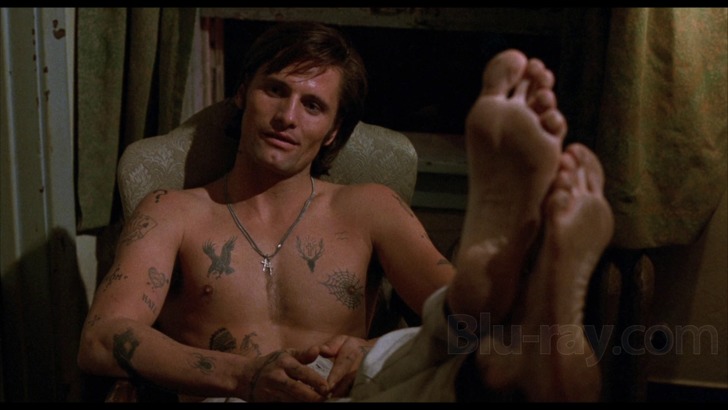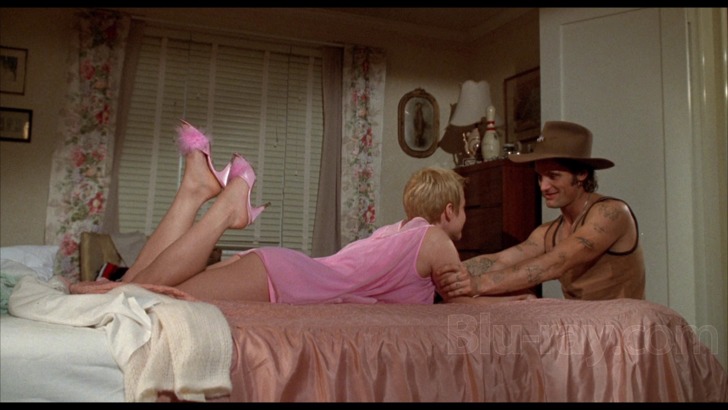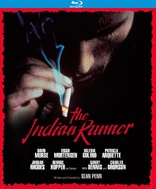The Indian Runner Blu-ray Movie
HomeThe Indian Runner Blu-ray Movie 
Kino Lorber | 1991 | 127 min | Rated R | Oct 24, 2017Movie rating
6.8 | / 10 |
Blu-ray rating
| Users | 4.0 | |
| Reviewer | 3.5 | |
| Overall | 3.5 |
Overview
The Indian Runner (1991)
A Vietnam vet comes home to his small town and finds himself in conflict with rules that his brother has vowed to uphold.
Starring: David Morse, Viggo Mortensen, Valeria Golino, Patricia Arquette, Charles BronsonDirector: Sean Penn
| Drama | 100% |
Specifications
Video
Video codec: MPEG-4 AVC
Video resolution: 1080p
Aspect ratio: 1.85:1
Original aspect ratio: 1.85:1
Audio
English: DTS-HD Master Audio 5.1 (48kHz, 16-bit)
Subtitles
English SDH
Discs
Blu-ray Disc
Single disc (1 BD)
Playback
Region A (locked)
Review
Rating summary
| Movie | 3.5 | |
| Video | 3.5 | |
| Audio | 4.0 | |
| Extras | 3.5 | |
| Overall | 3.5 |
The Indian Runner Blu-ray Movie Review
Reviewed by Brian Orndorf November 27, 2017After years spent making trouble for other directors, actor Sean Penn elected to take matters into his own hands for 1991’s “The Indian Runner,” assuming helming and screenplay duties, taking dramatic inspiration from “Highway Patrolman,” a song off Bruce Springsteen’s 1982 album, “Nebraska.” Penn would go on to have an erratic career behind the camera (scoring with “The Crossing Guard” and “Into the Wild,” but stumbling recently with “The Last Face”), but it’s interesting to see early cinematic interests immediately taking shape, with this American tale of brothers and disaster blending the raw energy of a Cassavetes picture (the helmer is thanked in the end credits) and the screen poetry of a Malick movie, ending up muddled and heavy-handed, but not without stunning moments of pure visual communication. “The Indian Runner” doesn’t feel like a complete story (an expected result when inspiration comes from a five-minute-long song), but it’s not without beautifully human moments and certain directorial flair from Penn and his tireless ambition to put everything rattling around his head on the screen.

In Nebraska in the 1960s, Joe (David Morse) is a highway patrolman getting over the justified shooting death of an armed crook, trying to remain a rock for his wife, Maria (Valeria Golino), and his young son. Returning home from Vietnam is Frank (Viggo Mortensen), a reckless young man who doesn’t want to face his parents, Mr. (Charles Bronson) and Mrs. Roberts (Sandy Dennis), preferring to reconnect briefly with Joe and take off again, making trouble for himself. As time passes, Joe grows increasingly concerned about Frank’s behavior, with the wild one teasing domesticity with girlfriend Dorothy (Patricia Arquette), but remains beholden to his self-destructive ways, leaving his older sibling on edge as he tries to offer support, only to watch his beloved brother choose the wrong path time and again, rendering the cop powerless.
Penn does an amazing job bringing out the bleakness of the Nebraskan setting, cutting through the snow and flatness with an opening car chase than ends in a shooting death, wrecking Joe as he tries to make sense of his job, taking the work only to support his family. There’s real atmosphere established in the early going that carries throughout, with Penn nailing the details of small town life and familial discord, setting up a battle of impatience between Joe and Frank, who are forever bonded as brothers, but have gone their own ways over the years, with the younger sibling choosing a life of crime and violence that wasn’t tempered during his rounds in Vietnam. Frank has returned home with even less interest in seeing his family, leaving Joe to remain the responsible one as his mother suffers and his father remains his steely self, quietly condemning Joe’s compromises to feed his family (Bronson is fantastic in a rare purely dramatic role).
“The Indian Runner” strives to be mystic, in touch with Native American culture and spiritual awakenings, but Penn often bites off more than he can chew, striving to merge a poetic sense of the passage of time with internalized processing, keeping Joe in perpetual worry mode while Frank is a loose cannon, terrified at the thought of living for anyone but himself. It’s a classic clash of sibling temperaments, but Penn plays heated exchanges through the prism of love, underlining the feelings the brothers have for each other as they experience different challenges in life, with Frank eventually agreeing to play the part of a decent human being, accepting stable employment and sharing time with Dorothy, giving responsibility a try.
These are intriguing arcs, but they’re often competing for screen time with Penn’s visual interests and compulsion to follow tangents in an attempt to discover local color. One prime example is found with Joe trying to keep his distance from an odd woman who’s interested in having the cop over to her house to explore his feelings after suffering through recent trauma. It’s an indulgent scene, basically here to scratch a few of Penn’s itches, and “The Indian Runner” has more to share as the story unfolds. It’s Penn’s way of injecting a sense of life into a simplistic screenplay, but the asides tend to slow down the effort, while editing in general feels panicked, as though dozens of subplots and supporting characters were snipped from the final cut at the last minute, finding narrative progression choppy at best.
The Indian Runner Blu-ray Movie, Video Quality 

While not a fresh scan of "The Indian Runner," the AVC encoded image (1.85:1 aspect ratio) presentation does just fine with the feature's evocative sense of Midwestern isolation and periodically frigid conditions. Detail is acceptable, delivering softer textures on close-ups and dimensional distances, while set decoration is also open for examination, studying period touches. Colors are adequate, with bright, sharp whites to help bring out the haunting beauty of snow. Costuming delivers stronger hues, representing era-specific style, and skintones are natural. Delineation has a few solidified moments, but largely remains communicative. Source is in fine condition.
The Indian Runner Blu-ray Movie, Audio Quality 

The 5.1 DTS-HD MA sound mix supplies a softly enveloping listening experience for "The Indian Runner," which doesn't utilize surrounds often, but offers compelling atmospherics for barren landscapes, while community scenes also carry depth. Musical moods are consistent, achieving softness to scoring cues, supported by appealing instrumentation. Soundtrack selections are equally stable. Dialogue exchanges are crisp and clean, managing different performance speeds and moments of aggression without distortion.
The Indian Runner Blu-ray Movie, Special Features and Extras 

- Making Of (26:12, HD) manages to pull off a minor miracle, getting Viggo Mortensen, David Morse, and Sean Penn to sit down and discuss "The Indian Runner" in individual interviews. This is not an in-depth discussion of the movie, but the essentials are covered, starting with Penn's initial inspiration to write the screenplay after a hearing an early version of Bruce Springsteen's "Highway Patrolman" thanks to his relationship with the singer's little sister, Pamela. Penn explores the early stages of production, securing financing and casting, sharing an amusing anecdote about mustache issues with Charles Bronson, who, amazingly, took the role of a widower shortly after becoming one himself. Mortensen describes a few deleted scenes he misses, and talks about his distance from Penn and Morse, who developed a brotherly bond during the shoot. Morse describes abyssal emotionality achieved in rehearsals that didn't make it into the feature, and talks about the "harsh poetry" of "The Indian Runner." Also of interest is an overview of the non-professional actors who appear in the film.
- And a Theatrical Trailer (2:30, SD) is included.
The Indian Runner Blu-ray Movie, Overall Score and Recommendation 

"The Indian Runner" looks great (cinematography by Anthony B. Richmond is a movie highlight) and it manages to locate the heart of brotherhood, especially the pain of an older sibling who desperately wants to protect the pure image of a brother that only exists in memory (the final scene is a heartbreaker). Penn gets this dynamic, excelling with the emphasis of family ties, but his command of the overall feature is erratic and artistry is a little grabby, with the end result bearing the marks of a fussed-with directorial debut, especially one from a tightly-wound actor trying to express himself visually instead of dramatically, often caught reaching through the screen to make his intentions known, but not always understood.
Similar titles
Similar titles you might also like

Return to Macon County
1975

Jayne Mansfield's Car
2012

Convoy 4K
1978

The Great Smokey Roadblock
The Last of the Cowboys
1977

Wisdom
1986

Fandango
Warner Archive Collection
1985

Man in the Shadow
1957

Deadwood: The Movie
2019

The Duel
2016

The Ride Back
1957

The Salvation
2014

The Desperadoes
1943

The Bravados
Limited Edition to 3000
1958

Cahill U.S. Marshal
1973

3 Godfathers
Warner Archive Collection
1948

Tell Them Willie Boy Is Here
1969

Cop
1988

Lonely Are the Brave
1962

The Shootist
1976

Run for Cover
Colorado
1955
